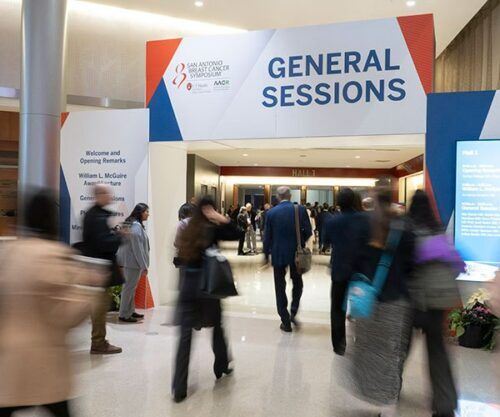About Immunotherapy for Breast Cancer

Harnessing the immune system to treat breast cancer
Decades before researchers understood how our immune systems work, the possibility of immunotherapy was intriguing. Step-by-step discoveries have moved us closer to realizing its potential. Immunotherapy has created a watershed moment for cancer care, and more recently for breast cancer care.
Here, we discuss what immunotherapy is, immunotherapy for breast cancer, how BCRF investigators are advancing its use, and more.
What is immunotherapy for breast cancer?
Immunotherapies, simply put, are drugs that harness a patient’s immune system to work against their cancer. The immune system is part of our body’s natural defenses against foreign substances. Only over the last century have researchers deciphered the components of the immune system and how they work together to stave off infections. From the earliest discoveries to more recent developments, researchers have learned how it can be used against cancer: The discovery of interferons and immune cells such as natural killer cells and T-cells helped create a picture of the immune system’s inner workings and accelerated research in immunology.
Immuno-oncology pioneer Dr. Lloyd J. Old believed that cancer cells had unique factors that distinguished them from normal cells and were recognizable by the body’s immune system. This principle fueled intensive research and clinical trials that resulted in the development and use of immunotherapies which, today, have shown success against cancers—including some breast cancers.
Several types of immunotherapies for breast cancer treatment are currently being investigated. These include immune checkpoint inhibitors (ICIs) that boost immune T-cell activity and monoclonal antibodies that target cancer proteins. Research into cancer vaccines that stimulate the immune system and CAR T-cell therapy to modify T-cells to attack cancer directly is also underway.
Monoclonal antibodies
Monoclonal antibodies (mAbs) are lab-engineered proteins that can seek out and bind to specific targets or antigens. By doing so, they can neutralize the antigen, preventing it from performing its usual activity. In some cases, mAbs can flag targets for destruction by other immune cells or the immune system. Herceptin® (trastuzumab) is a monoclonal antibody developed to recognize the HER2 receptor protein found on cancer cells. By binding to HER2 receptors, it blocks them from translating growth signals into the cells and also triggers the immune system to attack HER2-expressing cancer cells. For this reason, this targeted therapy can also be considered an immunotherapy.
Immune checkpoint inhibitors
The discovery of immune checkpoint proteins, particularly PD-1 receptors, improved immunotherapy outcomes for some breast cancers. Checkpoint proteins keep the immune system in check, essentially acting as a “brake” to prevent the immune system from attacking healthy cells. Present on immune T-cells, PD-1 binds to the PD-L1 or PD-L2 proteins on normal cells, deactivating any potential immune response against these cells. But cancer cells also make PD-L1 or PD-L2 proteins and are therefore recognized and essentially masked or protected by T-cells, which allows tumor cells to evade the body’s immune system.
Keytruda® (pembrolizumab) is a mAb that binds to and blocks PD-1 receptors found on immune cells. By binding to PD-1 receptors, pembrolizumab masks them and prevents tumor cells from using them to avoid recognition by the immune system. This allows the immune system to recognize, target, and destroy cancer cells even though they express PD-L1 or PD-L2 proteins that normally protect them. In this way, pembrolizumab serves as a PD-1 inhibitor, helping the immune system to slow or stop the growth and spread of cancer cells in the body. Based on its action, pembrolizumab is called an immune checkpoint inhibitor (ICI). Other ICIs are Opdivo® (nivolumab), Bavencio® (avelumab), Imfinzi® (durvalumab), and Jemperli® (dostarlimab).
Breast cancer vaccines
Vaccines help the body learn how to defend itself from foreign disease while lessening the dangers of a full-blown infection. They work by imitating an infection to engage the body’s natural defenses and stimulate the immune system to recognize and attack the infecting agent. Vaccines for treating breast cancer are a relatively new strategy currently being developed and tested. As cancer immunotherapies, vaccines recognize specific proteins associated with cancer cells. Scientists study how these proteins might trigger the immune system to produce antibodies against them. After identifying a specific protein or antigen, investigators then test them in laboratory models to choose the best antigen for creating a vaccine. Several cancer vaccines have been created to recognize different antigens associated with breast cancer and are currently being tested in clinical trials. Researchers hope that breast cancer vaccines will prove effective against the disease as well as preventing its recurrence.
In the prevention space, other vaccines have been developed to recognize the earliest signs of breast cancer. Researchers have identified several protein candidates that are thought to be associated with the initiation of breast cancer. Others have found specific protein candidates in people with a BRCA1 or BRCA2 mutation, both of which increase a person’s risk of developing breast cancer. Subsequently, vaccines have been developed that recognize these protein antigens and several clinical trials are in progress to test them. There has been tremendous progress towards bringing promising treatment and prevention vaccines to patients, thanks to research.
Immunotherapy for triple-negative breast cancer, including metastatic disease
The success rate for immunotherapy in breast cancer is highest in triple-negative breast cancer (TNBC) and metastatic triple-negative breast cancer. Although TNBC is a particularly aggressive form, it is thought to be the most immunogenic breast cancer subtype which may account for why some TNBCs are sensitive to immunotherapy with ICIs. Pembrolizumab is currently FDA-approved for treating advanced PD-L1-positive and early high-risk TNBC. Other ICIs are being tested in TNBC, including Bavencio following surgery and chemotherapy in early high-risk TNBC, and Imfinzi in combination with neoadjuvant chemotherapy in early TNBC.
Immunotherapy for other forms of breast cancer
HER2-positive breast cancers overexpress HER2, a protein that drives breast tumor growth. Herceptin and Perjeta® (pertuzumab) are monoclonal antibodies each used to treat HER2-positive breast cancer. Both work by binding to the HER2 protein on cancer cells, blocking signals that promote their growth and triggering the immune system to destroy the tagged breast cancer cells. The combination plus the chemotherapy agent Taxotere® (docetaxel) is used to treat metastatic HER2-positive breast cancer and as a neoadjuvant treatment in early-stage HER2-positive disease.
Side effects of immunotherapy for breast cancer
As with most breast cancer treatments, immunotherapy can cause possible side effects such as:
- gastrointestinal symptoms: nausea, diarrhea, colitis, or constipation
- flu-like symptoms: fever, chills, muscle aches, fatigue, or poor appetite
- respiratory symptoms: coughing or difficulty breathing
- infusion reactions if the drugs are administered by injection: allergic reaction, including fever, chills, rash, itchy skin, dizziness, wheezing, or trouble breathing
Other more serious side effects are possible but occur less often:
- autoimmune reactions: These reactions occur when the immune system starts attacking other parts of the body, particularly since immunotherapies exert their effect on the body’s immune system. The resulting side effects may be more serious, affecting the lungs, intestines, liver, hormonal glands, kidneys, or other organs.
- inflammation-related issues: myocarditis, pneumonitis, and hepatitis
- neurological complications: rare but serious effects like meningitis or encephalitis
It’s very important to report and discuss any new side effects with your breast cancer care team as soon as possible. The more serious side effects are rare, but keeping on top of any new symptoms will help doctors lessen their impact during and after treatment.
Research to advance immunotherapy for breast cancer
BCRF researchers are steadily working to develop new immunotherapeutic strategies as well as optimizing existing ones. Immunotherapies are currently used for certain subtypes of breast cancer, but studies are ongoing to expand their efficacy in other subtypes. As in many treatments, resistance can occur; deciphering why this happens and ways to overcome it, developing biomarkers that may predict resistance, as well as optimizing combination therapies are all areas of investigation as researchers explore novel personalized immunotherapeutic approaches.
Vaccines for breast cancer are another area of focus for BCRF investigators. Several breast cancer vaccines are currently in clinical trials, including vaccines for treating breast cancer and/or preventing it or its recurrence.
Other immunotherapies for breast cancer treatment are being pursued, like bispecific antibodies (bsAbs) that can recognize the cancer antigen and immune T-cells. With one antibody binding these two factors, the cancer cell is brought closer to T-cells that can then target them for destruction. The development of bsAbs for treating breast cancer is in its infancy but active research aims to bring this strategy to the clinic.
Another idea being pursued is adoptive T-cell therapy, which primes a patient’s immune cells to work more efficiently against breast cancer. A patient’s immune cells are isolated, grown in the lab in large amounts, and then intravenously given back to the patient. One such therapy is chimeric antigen receptor (CAR) T-cell therapy. This strategy isolates the patient’s T-cells and genetically modifies them to express a cancer-specific antigen receptor on their surface. When reintroduced into the patient, the CAR T-cells are more efficient at recognizing the cancer cells and targeting and destroying them. This innovative immunotherapy has been successful in blood cancers like leukemia, and its use in breast cancer remains under investigation.
BCRF and other researchers are pursuing advances in immunotherapy that will widen its use in breast cancer treatment, steadily improving the success rate of immunotherapy for breast cancer.
https://www.cancer.gov/about-cancer/treatment/types/immunotherapy
https://pubmed.ncbi.nlm.nih.gov/30345906/
Finn OJ. Human tumor immunology at the molecular divide.J Immunol. 2007;178(5):2615-2616.
https://pmc.ncbi.nlm.nih.gov/articles/PMC11466495/
https://pmc.ncbi.nlm.nih.gov/articles/PMC8227172/
https://www.annalsofoncology.org/article/S0923-7534(22)03791-7/fulltext
https://pubmed.ncbi.nlm.nih.gov/30345906/









